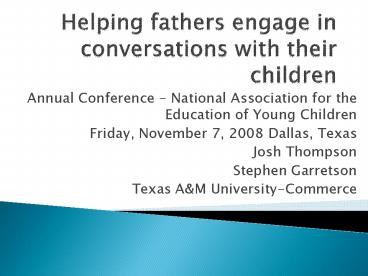Helping fathers engage in conversations with their children - PowerPoint PPT Presentation
1 / 22
Title:
Helping fathers engage in conversations with their children
Description:
How do children respond / react to their fathers' language? ... versus Father's interest of primary concern. Ask specific questions (child holds the answer) ... – PowerPoint PPT presentation
Number of Views:94
Avg rating:3.0/5.0
Title: Helping fathers engage in conversations with their children
1
Helping fathers engage in conversations with
their children
- Annual Conference - National Association for the
Education of Young Children - Friday, November 7, 2008 Dallas, Texas
- Josh Thompson
- Stephen Garretson
- Texas AM University-Commerce
2
- Words work. We use them all the time to do
things. Children know this. They are listening,
copying, experimenting, approximating, trying
every which way to communicate. What do we, as
caregivers and classroom teachers, know about the
way men talk to their children, and how does
their communication affect the child, especially
the development of her language and literacy?
This interactive session will examine audio and
video samples of men talking to children, with
expert guidance into the content and meaning of
this interaction. Participants will learn how to
encourage fathers to expand their communication
styles, thus increase the childs language and
literacy development. Specific skills and
strategies to improve father-child communication
will be demonstrated.
3
How do men dominate women with their language?
- That they dominate is well-documented
- How they dominate varies
- What do teachers and caregivers do when men tend
to dominate them with language? - How do children respond / react to their fathers
language? - How can teachers and caregivers help fathers
engage in conversations with their children?
4
Usual Suspects?
- Presumed examples of language of domination
- Interruption
- Volubility
- Silence
- Topic raising
- Presumed examples of language of powerlessness
- Indirectness
- Taciturnity
- Silence
- Tag questions
- (Tannen, 1994, p. 21)
5
Some of the Real Culprits
- Relativity of five linguistic strategies
- Indirectness
- Interruption
- Silence versus volubility
- Topic raising
- Adversative-ness
6
Trouble talk
- Solidarity way of feeling closer
- Power offer solutions
7
Stress Response
- Fight or flight Cannon (1932)
- Tend befriend Taylor (2002)
8
Unidimensional model (Tanner 1994, p. 27)
9
Multidimensional model(adapted from Tannen 1994,
p.28)
10
How do men talk to children?
- Routines
- Rituals
- Traditions
11
How can EC teachers/caregivers help fathers?
- Story time book reading
- Mealtimes
- Games
- Driving
- Homework Helps
- Meeting people
- Prayer, meditation, centering on interior life
- Making peace, reconciling
- Being a warrior becoming a lover
12
Mealtimes
- Be there
- Without distractions (TV, radio, phone, etc)
- Help prepare, w/ children
- Set boundaries for conversations
- (tone, topic, respect)
- Today conversation, family stories
- Family cleanup
- Listen w/ eye contact
13
Cleanup
- Taking time step by step
- Divide into small steps
- Team work (modeling) / Partnership
- Sing songs
- Make it fun. Start simple
- Set tone -gt closeness
- Ask questions (open-ended)
- Patient -gt accept what child does, DAP
14
Drive time
- Ask about childs interests
- Ask about their day
- Open-ended questions
- Reword fish for more complex response
- Prepare / communicate whats next
15
Drive time, continued
- ltPower going to the childgt
- versus Fathers interest of primary concern
- Ask specific questions (child holds the answer)
- Work off of their responses
- Follow up to specific concerns brought up by the
child - Child participation / input
16
Sports / Games
- Kids imitate both good bad
- Sportsmanship how to lose, how to win
- Appropriate language / mannersisms
- Understand purpose of the game
- Tolerance of ability / passion
- Understand rules / play by play
- Developmental abilities
17
Story time
- Importance of it
- Show him how reading it aloud
- Relate it from his childhood
- Difference between mom dad reading
- Meaningful book to promote conversation
- Relate it to fathers job / hobbies to come to
the classroom
18
Bedtime
- Rituals
- Bath time
- Take time to create and foster contact w/ child
- Story
- Use voices, tone, velocity
- Share time
- Ask how their day was
- What was important
- Security help kids feel safe
- Take the time to comment on the kids work
19
Conclusion
- Dads are talking
- Kids are listening
- Teachers have clues
- Do NOT make the dad into a teacher
- Let him be real
- Power is useful in his relationship w/ child
- Closeness does not deny that power
20
Helping fathers engage in conversations with
their children
- Annual Conference - National Association for the
Education of Young Children - Friday, November 7, 2008 Dallas, Texas
- Josh Thompson
- Stephen Garretson
- Texas AM University-Commerce
21
- Josh_Thompson_at_tamu-commerce.edu
- 214-663-6102
- http//faculty.tamu-commerce.edu/jthompson/
- Stephen_Garretson_at_tamu-commerce.edu
- 972-775-7231
- http//faculty.tamu-commerce.edu/sgarretson/
22
(No Transcript)































